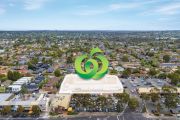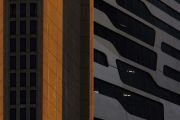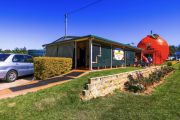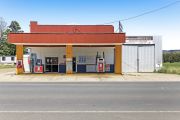
Two km of private beaches: Remote Cape York beauty yours for $15m
An 88-hectare remote wilderness retreat with nearly two kilometres of private beaches on the west coast of Cape York – Australia’s most northerly point – has “reluctantly” been put on the market by Sydney businessman Geoff Humby with a $15 million asking price.
Mr Humby, who founded building remediation and waterproofing company Premier Waterproofing, has spent the past two decades developing plans to build an eco-tourism resort on Utingu – as the property is known – but says it is time to pass the baton to someone else as he approaches 80.
“I’ve got mixed feelings about selling, but it’s all about ages and stages. The last thing I want to do is get rid of it, but I can’t take it to the next step,” he told The Australian Financial Review.

Situated to the north of Bamaga, the secluded freehold site offering a mix of white-sand beaches, rainforest and bushland, was from 1911 to 1919 the home of Australian novelist Jack McLaren, who planted Australia’s first coconut plantation there. McLaren wrote about his time at Utingu in his autobiographical novel My Crowded Solitude.
“I would live no other life. For solitude and closeness to nature, especially when coupled with graceful palms, white beaches, blue skies, iridescent, island-dotted seas and other adjuncts of tropical beauty, have an irresistible charm,” McLaren wrote of Utingu.
Eight-five years later, Mr Humby took a punt and bought Utingu sight unseen for just $240,000 after energy giant Chevron abandoned plans to buy it and build a pumping station on it connecting gas fields in Papua New Guinea to the Australian mainland.
Flying over it for the first time many months later, Mr Humby said it was “the most beautiful block of land I’ve ever seen – and that’s saying something”.
“It had flown under the radar for so many years – the people who owned it had never been there. It was left to them in a will and not been visited for 50 years”

With a climate similar to Bali, the Maldives or the Caribbean, incredible natural beauty and a private island feel despite being on the mainland, the site was “absolutely remarkable”, Mr Humby thought and wondered “why no else knew about it”.
When he did finally set foot on the property nine months after buying it, Mr Humby said he could immediately see its commercial potential in an area with very little in the way of tourism infrastructure, apart from a few caravan parks.
“I thought to myself, ‘Oh my god, I could have some fun here.’”
Drawing on his building background and his experience building on remote sites, Mr Humby built a two-level manager’s residence and an adjacent machinery building with bunk accommodation for 10 guests.
Apart from during the COVID-19 pandemic, he has visited Utingu five to six times a year for two- to three-week breaks from his busy corporate life.
“It’s been my mental release, it’s where I take a block of concrete off my brain. It’s kept me alive and swinging,” Mr Humby said.

Together with his wife, he has also established gardens and “planted lots of stuff”, while laying the groundwork for a future commercial tourism venture by obtaining approval in 2007 for an eco resort with 29 bures – a type of wood and straw hut – and other buildings connected via walkways and decks.
All this, Mr Humby said, could be assembled offsite and delivered flat-pack for a relatively easy construction process and without the need to chop down any significant trees.
“We’ve done all the groundwork and landscaping, so it could be an instant launch.”
“With a few million dollars you could get the ball rolling,” he said. “It can cost a lot or a little, depending on your vision.”
Mr Humby has appointed Lynn Malone and Barbara Wolveridge of Sotheby’s International Realty to sell Utingu via private treaty.
“The oceanfront freehold land has the attributes of an island but with a ‘backdoor’ with direct access to services, transportation – land, water and air – and staff,” Ms Malone said.











